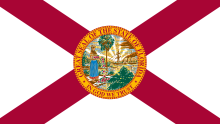Bilateral Relations: Israel - Florida

History of Jewish Settlement in Florida
Jewish settlement in Florida dates back to the 18th century, but significant change began in 1820 with Moses Elias Levy, a Sephardic Jew, who played a pivotal role in early Jewish settlement. In the 1820s, Levy established Pilgrimage Plantation in Micanopy as a sanctuary for persecuted Jews from Europe. His efforts laid the groundwork for a lasting Jewish presence in the region. Levy’s legacy continued through his son, David Levy Yulee, who became the first Jewish U.S. Senator.
Following World War II, South Florida saw a massive influx of Jewish settlers. The Jewish population in Dade County grew from 2,500 in the 1890s to nearly 750,000 today.
Today, South Florida boasts one of the largest Jewish populations in the United States, with thriving communities in Miami-Dade, Broward, and Palm Beach counties. The region is also home to a significant number of Jewish immigrants from Latin America, Russia, and Israel, adding to the rich cultural diversity of the community.

The United States, led by President Truman, a native of Missouri, was the first to recognize the independence of the State of Israel, 11 minutes after David Ben-Gurion declared the establishment of the State of Israel.

Opening of the Consulate General of Israel in Miami
The Israeli Consulate General in Miami was officially opened in 1992. Its establishment significantly strengthened the diplomatic, economic, academic, and cultural relations between Israel and Florida, Kansas, Missouri, and Puerto Rico. The consulate also provides essential services to Israeli citizens and the Jewish community in the region.
The consulate, located at 100 North Biscayne Boulevard, Suite 1800, Miami, offers a range of consular services, such as visa and passport processing, notarial services, and emergency assistance to Israeli nationals. It plays a crucial role in promoting Israeli interests and fostering cooperation with local governments and organizations.

Governor Jeb Bush Visit to Israel
Governor Jeb Bush made a significant trip to Israel in 2005, where he focused on strengthening economic and academic ties. This visit included meetings with Israeli leaders and the signing of agreements aimed at boosting collaboration in various sectors, such as technology and education.

Governor Charlie Crist Visit to Israel
Shortly after taking office, Governor Charlie Crist led a trade mission to Israel in May 2007. The visit aimed to enhance trade relations and explore collaborative opportunities in technology and security. Crist’s mission included meetings with Israeli business leaders and government officials to foster economic ties between Florida and Israel.

Governor Rick Scott's Visit to Israel
Governor Rick Scott visited Israel in December 2011 as part of a trade mission aimed at promoting economic development. The trip included discussions on technology partnerships and investment opportunities.
Another visit occurred in 2017, where Scott met with Israeli officials to discuss cybersecurity and economic cooperation. This trip further solidified Florida’s commitment to strengthening ties with Israel.

Florida Passes Anti-BDS Bill
Florida has been at the forefront of enacting legislation to counter the Boycott, Divestment, and Sanctions (BDS) movement, which aims to exert economic and political pressure on Israel. The state's legislative efforts reflect a strong stance against the BDS movement and its perceived negative impact on Israeli-American relations and the Jewish community.
House Bill 527 (2016):
Overview: This bill prohibits state and local governments from entering into contracts worth $1 million or more with companies that engage in boycotts of Israel.
Provisions: Requires companies to certify that they are not participating in a boycott of Israel as a condition of contracting with state or local government entities.
Impact: Strengthened Florida’s economic ties with Israel and positioned the state as a strong opponent of the BDS movement.
Governor’s Role: Signed into law by then-Governor Rick Scott, emphasizing Florida’s commitment to support Israel and counteract BDS efforts.

Establishment of the Florida-Israel Business Accelerator (FIBA)
The Florida-Israel Business Accelerator (FIBA) was established to foster economic collaboration between Florida and Israel by supporting Israeli startups in expanding into the U.S. market through Florida. This initiative was designed to leverage the innovative technologies emerging from Israel and connect them with the robust business ecosystem in Florida, particularly in the Tampa Bay area.
FIBA was founded in 2016. The initiative was spearheaded by the Tampa Jewish Community Centers & Federation, along with significant support from local business leaders and government entities.
FIBA aims to bridge Israeli innovation with the U.S. market by providing resources, mentorship, and networking opportunities to Israeli companies.
Goals: To attract innovative Israeli startups to Florida, helping them establish operations, create jobs, and contribute to the local economy while enhancing technological advancements in the region.
FIBA Offers a comprehensive program that includes mentoring, access to investors, office space, and strategic connections and a business development program to assists Israeli startups with business development strategies tailored for the U.S. market, focusing on industries such as healthcare, cybersecurity, fintech, and more.
FIBA collaborates with local universities, research institutions, and business entities to provide a supportive ecosystem for startups.
FIBA Received backing from state and local government officials, highlighting the importance of international business relations and economic development.
Several startups have benefited from FIBA’s programs, securing investments, expanding their operations, and achieving significant business milestones. FIBA has successfully facilitated numerous Israeli companies in establishing a presence in Florida, contributing to job creation and economic growth.
FIBA continues to play a pivotal role in strengthening the economic ties between Florida and Israel, showcasing the mutual benefits of this international collaboration.
For more detailed information, you can visit the official FIBA website and Fiba Facebook page

Senate Bill 86
Overview: This legislation prohibits public entities from investing in or contracting with companies that boycott Israel.
Provisions: Extends the certification requirement to include public pension funds, ensuring that state investments do not support companies involved in the BDS movement.
Support: Garnered bipartisan support, highlighting widespread legislative and public backing for measures countering the BDS movement.
Governor’s Role: Governor Rick Scott continued to champion anti-BDS efforts, reinforcing Florida’s legislative framework against boycotts targeting Israel

Governor Ron DeSantis' Visit to Israel
Governor Ron DeSantis made a landmark visit to Israel in May 2019, leading the largest trade delegation from Florida to Israel. The delegation included over 100 participants, including state officials, business leaders, and university representatives. During this visit, DeSantis signed multiple MOUs between Florida and Israeli institutions and held the first-ever Florida Cabinet meeting abroad at the U.S. Embassy in Jerusalem. He also signed legislation combating antisemitism in Florida schools.
2023: In April 2023, DeSantis visited Israel again, signing House Bill 269 to enhance measures against antisemitic incidents. This visit marked the 75th anniversary of Israel’s independence and reinforced Florida’s ongoing support and collaboration with Israel in various sectors .
Learn more about DeSantis visit to Israel

House Bill 741
Overview: This bill explicitly addresses antisemitism in public education, prohibiting discrimination based on religion in the state’s K-20 public education system.
Provisions: Defines antisemitism, including efforts to delegitimize Israel, as part of its scope. This includes comparing contemporary Israeli policy to that of the Nazis.
Impact: Strengthens protections against antisemitism in educational institutions, indirectly countering the BDS movement’s influence.
Governor’s Role: Governor Ron DeSantis signed this legislation during a historic visit to Israel, demonstrating a continued commitment to combating antisemitism and supporting Israel.
Economic and Political Ties: Florida’s anti-BDS legislation underscores the state’s strong economic and political ties with Israel. By preventing public funds from supporting entities that boycott Israel, the state reinforces its support for Israeli businesses and investments.
Bipartisan Support: The legislative measures received bipartisan support, reflecting a broad consensus on the importance of opposing the BDS movement and supporting Israel.
National Influence: Florida’s proactive stance has influenced other states to adopt similar legislation, contributing to a nationwide effort to counteract the BDS movement and support Israel.

Aventura - Modi’in-Maccabim-Reut Sister City Agreement
Many sister city agreements and relationships between cities in Israel and Florida have been established These partnerships foster cultural, educational, and economic exchanges between the paired cities, strengthening the ties between Florida and Israel.
Among these are:
1. Sunny Isles Beach and Netanya
2. Tampa and Ashdod
3. Gainesville and Kfar Saba
4. Hollywood and Herzliya
5. Tallahassee and Ramat Ha-Sharon
6. Miami Beach and Eilat
7. Palm Beach County and Tzahar (a regional council including Tzfat, Hatzor HaGlilit, and Rosh Pina)
8. Cocoa, Florida, and Beit Shemesh,
